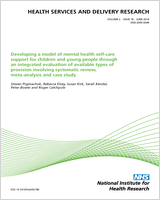Included under terms of UK Non-commercial Government License.
NCBI Bookshelf. A service of the National Library of Medicine, National Institutes of Health.
Senior J, Forsyth K, Walsh E, et al. Health and social care services for older male adults in prison: the identification of current service provision and piloting of an assessment and care planning model. Southampton (UK): NIHR Journals Library; 2013 Aug. (Health Services and Delivery Research, No. 1.5.)

Health and social care services for older male adults in prison: the identification of current service provision and piloting of an assessment and care planning model.
Show detailsGeneral information
- This assessment tool is divided into three areas: wellbeing, social care and discharge from prison. It revisits information that may already have been provided on initial reception, and identifies new information that has come to light following a few days in custody. It then explores any issues relevant to ensuring appropriate discharge from prison.
- It is to be completed 7–10 days after the prisoner has arrived in the prison.
- Ideally it will be completed by both health care and discipline staff together, jointly interviewing the prisoner. This is provided he is happy to discuss his health issues in front of the discipline officer. However, it may be more appropriate for the discipline officer to take the lead and refer to health care if necessary.
- The assessment will be reviewed at a time deemed appropriate by staff completing it, and the prisoner.
- A care plan must be completed by the staff conducting the assessment, and agreed with the prisoner. The prisoner may retain a copy of the care plan if they want to.
Social assessment
The aim of this part of the assessment is to discuss any issues with the prisoner that might be affecting his ability to settle into prison life and feel safe. The questions are divided into three sections: relationships, activities and mobility. There is space in the assessment to record discussion on any other areas that might be important to the prisoner.
Wellbeing assessment
This part of the assessment revisits the information gathered during medical reception a week earlier to see if there have been any changes, and to identify if the prisoner requires further health/wellbeing assessment following the first week of settling into custody.
Discharge from prison
This part of the assessment explores the issues that require addressing prior to the prisoner being discharged from prison.
SECTION 1: SOCIAL ASSESSMENT
| Name | Date of Birth | |
| Age | NOMS Number |
A: Relationships
Ask the person if they have been able to maintain their social and family relationships whilst they have been in prison. Is anyone looking after their finances/benefits, etc.? How are they getting along with other prisoners? Do they feel safe?
B: Activities
What is the prisoner doing with their time? What are their interests/hobbies? Are they aware of what is available to them, e.g. gym, over 60s club, library? Do they want to work? Are they going out on exercise? If not, why not?
C: Mobility
Is the prisoner managing to get around safely? Can they collect their own meals, get in/out of bed, get to/from their cell to association, and in/out of shower? Can they walk to visits/healthcare/treatment room, etc.?
SECTION 2: WELLBEING ASSESSMENT
D. Emotional wellbeing
Is the prisoner coping OK with being in prison? How are they feeling in general? Are they feeling supported? Are they getting on with other prisoners – feeling safe? Are they sleeping? Do they have any concerns?
E. Physical wellbeing
Are there any physical problems that have arisen since first reception in to prison? Can they think of anything they might have forgotten to mention when they first arrived? For example, have they got their reading glasses/contact lens solution, etc.? Does the prisoner know how to access health care? Are they able to attend to their own personal hygiene needs effectively?
F. Medications and treatment
Does the prisoner take any medication? If so, have they been getting it at the right times? Are there any problems with getting their medication, e.g. ability to attend treatment room, pressured into giving it to other prisoners?
G. Any other concerns that have not already been mentioned?
SECTION 3: DISCHARGE FROM PRISON
H. Discharge from prison
When is the person being discharged from prison? Where do they plan to go? Will they be welcome there? Do they have finances in place to support themselves? Are there any health care/social care needs that need to be considered?
| ______________________________ | _________________________ | _________________ |
| Healthcare staff (sign) (IF PRESENT) | (Print Name) | Date |
| ______________________________ | _________________________ | _________________ |
| Discipline staff (sign) | (Print Name) | Date |
| ______________________________ | _________________________ | _________________ |
| Prisoner (sign) | (Print Name) | Date |
Care plan
To be completed in conjunction with prisoner
| Number | Issue raised from assessment | Aim of action | Action (including by whom and when) | Date to be reviewed and rationale | Status of action |
|---|---|---|---|---|---|
| 1 | |||||
| 2 | |||||
| 3 | |||||
| 4 |
Review
Date:
Reviewer(s):
| Number | Progress since last review | Action planned | Next review with rationale |
|---|---|---|---|
| 1 | |||
| 2 | |||
| 3 | |||
| 4 |
Review
Date:
Reviewer(s):
| Number | Progress since last review | Action planned | Next review with rationale |
|---|---|---|---|
© 2012 The University of Manchester and University of Leeds all rights reserved.
- Older prisoner Health and Social Care Assessment and Plan (OHSCAP) - Health and ...Older prisoner Health and Social Care Assessment and Plan (OHSCAP) - Health and social care services for older male adults in prison: the identification of current service provision and piloting of an assessment and care planning model
Your browsing activity is empty.
Activity recording is turned off.
See more...